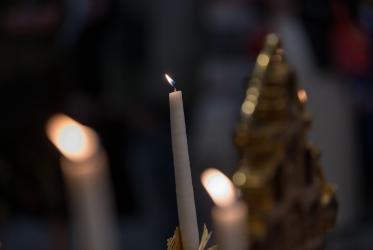A workshop co-facilitated by the World Council of Churches (WCC) and the South Sudan Council of Churches in South Sudan on 1-3 May drew 18 people to explore resources churches use to aid in trauma healing. Participants also discussed potential common approaches that could unite churches in their response to people faced with trauma.
The vast majority of people are exposed to trauma in their lifetime. In Nigeria, Sierra Leone and South Sudan, the majority of those exposed to trauma - mainly caused by injustice and violence - also develop post-traumatic stress disorder, locally referred to as “wounded, bleeding or hurting hearts.”
In South Sudan, it can be argued that anyone from ages 2-50 years lives with trauma, especially trauma caused by armed conflict and gender-based violence. Unchecked trauma renders people incapable of effectively participating in sustainable development, and trauma healing has become an imperative to achieving justice and sustainable peace. Yet many churches continue to use resources that are ecumenical or culturally inappropriate.
The WCC Trauma Healing Project identifies existing best practices in trauma healing; discerns possible gaps and needs; unearths the social-cultural, historical and political complexities behind the existing causes of trauma; and develops the basis for possible ecumenical resources.
“This workshop is a critical part of a process that will culminate in a developed ecumenical resource for trauma healing as well as the equipping of churches to effectively contribute to trauma healing of the people of Nigeria, Sierra Leone and South Sudan,” affirmed Dr Fulata Lusungu Moyo, WCC consultant for Trauma Transformation and Healing. “We have a very good team of facilitators and church leaders who have been involved in similar processes before.”
For South Sudan, this process is crucial, said James Odong, deputy general secretary of the South Sudan Council of Churches. “This workshop is the beginning of a long process that will see all churches in South Sudan participating in trauma transformation and healing so that every South Sudanese is, in the long run, reached out to for trauma healing. We are thankful to WCC for collaborating with us in this crucial intervention.”
Ebun James-Dekam, general secretary of the Sierra Leone Council of Churches, said war, Ebola and natural disasters have caused increasing trauma for people. “The women and girls are the most impacted because, on top of the other causes of trauma, they are also the majority that face sexual and gender-based violence, including female genital mutilation. We need this manual to unite our efforts to mend the hearts of our people,” said James-Dekam.
Rev. Dr Ibrahim Wushishi Yusuf, general secretary of Christian Council of Nigeria, said: “If we are to be part of the fulfillment of Jesus’ gospel, to ensure that there is fullness of life for all, then we have to continue to work together so as to rescue our people from this disease called trauma.”
WCC member churches in South Sudan





